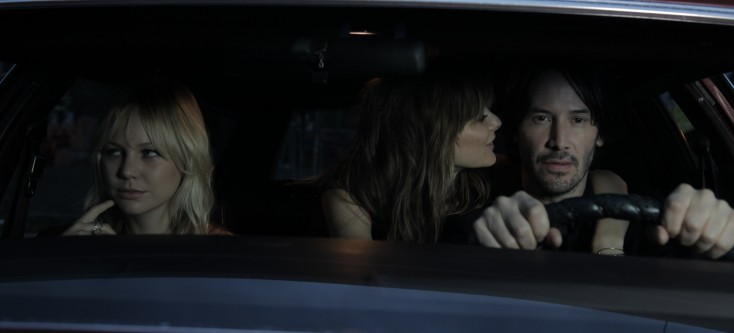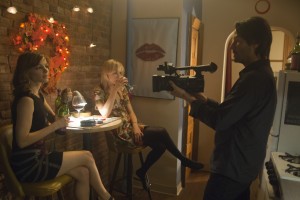By ANGELA DAWSON
Front Row Features
HOLLYWOOD—Keanu Reeves never seems to age. Though pushing 49, the “Matrix” star looks about 15 years younger. Maybe his youthful appearance is attributable to the fact that he’s wearing all black for an interview. (Fashionistas know black always makes you look better.) Or maybe he simply has good genes.
Reeves’ agelessness fits well with the theme of the new movie he is promoting—a little indie called “Generation Um…” in which he plays a kind of mysterious fellow who hangs out with a pair of beautiful party girls. Written and directed by editor turned filmmaker Mark Mann, Reeves plays John, a city dweller who films the girls (Aussie newcomers Bojana Novakovic and Adelaide Clemens) with a digital camera he has stolen while out on a stroll. He probes his feral-like companions with intimate questions about their lives, sexual attitudes, and proclivity for drugs in an almost unrelenting way. At one point, he follows one of them into a bathroom and inundates her with questions about a childhood trauma. Ultimately, John’s questions and ever-present camera tests the trio’s friendship as they prepare for another night of partying.
It’s the first film Reeves has appeared since the 2010’s “Henry’s Crime.” That romantic comedy, which paired him with “Bates Motel” star Vera Farmiga, earned just $204,000 worldwide.
These days, the former box office star and action hero seems content to focus on smaller budget films.
He recently tried his hand at directing and producing. Drawing on his Chinese roots and love of martial arts, Reeves makes his directorial debut in the upcoming martial arts drama “Man of Tai Chi.” He also produced and stars in the documentary “Side By Side,” about the rise of digital filmmaking, in which he interviews filmmakers including Martin Scorsese about the changing technology. He also stars in the upcoming historic drama “47 Ronin,” in which he plays one of the legendary Japanese samurai.
Wary of the press, Reeves speaks about his latest projects in a guarded way. Behind the long hair and scruffy beard, he’s not about to give away anything too personal.
Q: It’s interesting that “Generation Um…” is a film about a guy making a film about these girls, while all along you’re being shot by the director. Did you have to be cognizant of where the camera shooting you was at all times?
Reeves: Yes. Technically speaking, it was challenging because you have a 360 (perspective) and the set is hot everywhere. No matter where you put a camera, you’re shooting from every direction at the same time. Watching Mark (Mann) make a film, I saw him dig into what the camera allowed him to do and how it allowed him to evolve. There was an unpredictable quality to it.
Q: Was it tough as an actor because you’re playing a filmmaker throughout?
Reeves: Yeah. It was really fun and it was a great opportunity. When I was going into the project, I didn’t know that I was going to be filming literally the sequences involving the girls. I was assuming that the cinematographer would take that over and Mark said, “No, you can do it.” That was a great trust and a cool opportunity. I was really excited by that. In keeping with Mark’s vision of the film, we learn about (my character) John by what he looks at through the lens and we learn about the other characters through his camera. It also plays into the idea of structure and variety in the picture and an idea of perspectives. Who are we? Who do we think we are? Also, it was playing with the idea of a nontraditional film and story form. It starts out like a mystery, which gets resolved by the end of the picture. When I read the script, it had an emotional impact on me of how this story comes together. That’s what Mark and all the other artists involved did. When I watch the film, I’m moved.
Q: Was any of the dialogue ad-libbed or was it mostly scripted?
Reeves: It was all scripted. It’s a testament to Mark’s writing that he could come up with dialogue that was so naturalistic.
Q: What is it about the script that drew you in?
Reeves: I found out about this script while I was making “Henry’s Crime.” The producer Alison (Palmer Bourke) of that was also working on this picture so when I read the script I was like, “This is amazing. I’d like to meet the director /writer.” So I met Mark and we got along and went on to make the film. After that, I’ve been away a couple years working on a movie.
Q: Playing an amateur filmmaker in this, did you draw on your experience of being interviewed on camera?
Reeves: No. My character gets to ask a couple of questions but he’s dealing with a couple of wild lions with these two ladies. The thing is, he has one intention. The character Violet (Novakovic) says, “Ok, let’s make this a show. My show.” And John’s like, “What is your show? What is friendship?” He goes on an expedition investigating their apartment. For me, it was really connected to the character and to the movie. I didn’t really take it from the sense of what it’s like to be an interviewer or be interviewed. I’m just taking it to John’s world. I just tried to do the right thing and not do too much shaky-cam. (He chuckles.)
Q: At one point in the movie John says, “Life is more disappointing to me than to my parents.” But you’ve had a lot of success in your life. Could you relate to that statement at all?
Reeves: Well, we all feel our disappointments somewhere at some point. I could completely relate to some of that.
Q: Your character seems a little befuddled by the actions of these young girls. Could you relate to that generation gap?
Reeves: Yes. There’s one point where Violet (Novakovic) says to him, “Don’t hate me because I’m beautiful,” and then I say, “I don’t hate you. I just find you confusing.”
Q: What do you think of the younger generation today? Does the title refer to them?
Reeves: I don’t think the intention of the title refers to this generation. I’m playing 40 years old in the film. Bojana’s character is in her 30s and Adelaide is in her 20s. So it’s bigger than one era. That was the intention. It’s asking questions and asking for interpretation, which is a kind of connection. The characters in the film are seeking to connect but are damaged and have circumstances that prevent them from doing so.
Q: Did you listen to a particular band or song to inspire you while you were making this?
Reeves: There have been moments in the past where I have listened to particular music going into a scene for preparation or inspiration. On this particular project, though, I didn’t. But there are rhythms that I certainly connected to.
Q: What kind of music are you into now?
Reeves: I haven’t been listening to much music recently.
Q: What did you listen to when you were making “The Matrix?”
Reeves: I didn’t listen to much music then. I wasn’t asked to consider any music or songs in the making of that picture.
Q: You recently made “Man of Tai Chi.” What was your first directing experience like?
Reeves: I had a great experience.
Q: What is that film about?
Reeves: It’s an English-Chinese kung fu movie and it’s basically about a young man who gets involved in an underground fighting ring to save his temple and whether or not he loses his soul.
Q: Where did that idea come from?
Reeves: It was a story developed over the past five years with the lead actor (Tiger Chen).






